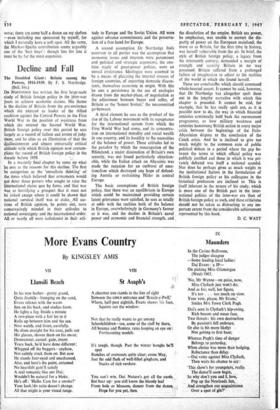Decline and Fall
DR NORTHEDGE has written the first large-scale study of British foreign policy in the inter-war years to achieve academic stature. His theme is the decline of Britain from the pre-eminence which she enjoyed as leader of the Allied coalition against the Central Powers in the First World War to the position of weakness from which she entered the Second World War. British foreign policy over this period he sees largely as a record of failure and errors of judg- ment, and he cites as an illustration of that the disillusionment and almost universally critical attitude with which British opinion now contem- plates the record of British foreign policy in the decade before 1939.
In a masterly final chapter he sums up what he sees as the reasons for this decline. The first he categorises as the 'unrealistic thinking' of the times which believed that armaments would not deter those powers who sought to raise the international status quo by force, and that war was so horrifying a prospect that it must not be risked except where it could be shown that national survival itself was at stake.. All sec- tions of British opinion, he points out, were conservatively minded in their attitudes to national sovereignty and the international order. All or nearly all were isolationist in their atti- tude to Europe and the Soviet Union. All were against advance commitments and the preserva- tion of a free hand for Europe.
A second assumption Dr Northedge finds common to all parties was the assumption that economic issues and interests were paramount and political and strategic arguments, the one- time staple of great-power politics, were an unreal irrelevance. Ideologies were assumed to be a means of placating the internal stresses of foreign countries, of exporting domestic discon- tents, themselves economic in origin. With this he sees a persistence in the use of analogies drawn from the market-place, of negotiation as the adjustment between buyer and seller, of Britain as the 'honest broker,' the uncommitted go-between.
A third element he sees as the product of the rise of the Labour movement with its repugnance for the international system from which the First World War had come, and its concentra- tion on international morality and social wealth in one country, and its hostility to the necessities of the balance of power. These attitudes led to the paradox by which the reoccupation of the Rhineland, a major diminution of Britain's own security, was not found particularly objection- able, while the Italian attack on Abyssinia was made the occasion for an outburst of emo- tionalism which destroyed any hope of defend- ing Austria or restraining Hitler in central Europe.
The basic assumptions of British foreign policy, that there was an equilibrium in Europe which could be maintained providing certain latent grievances were satisfied, he sees as totally at odds with the realities both of the balance in Europe, overwhelmingly in Germany's favour as it was, and the decline in Britain's naval power and economic and financial strength, and
the dissolution of the empire. British sea power, he emphasises, was unable to correct the dis- parity of power on the European mainland; the more so as Britain, for the first time in history, was herself vulnerable from the air. In brief, the style of British foreign policy, a legacy from the nineteenth century, demanded a margin of strength and security Britain in no way possessed. Britain suffered from a prolonged failure of imagination to adjust to the realities of the world in which she found herself.
These are conclusiAs which should command whole-hearted assent. It cannot be said, however, that Dr Northedge has altogether spelt them out in the lengthy narrative with which this chapter is preceded. It cannot be said, for example, that he has really spelt out, as it is possible now to do, the way in which financial anxieties continually held back the rearmament programme, or how military weakness and anxieties hamstrung British action in every major crisis between the beginnings of the Italo- Abyssinian dispute to the conclusion of the Czech crisis. And he is inclined to give too much weight to the common coin of public political debate in a period where the gap be- tween the terms in which official policy was publicly justified and those in which it was pri- vately debated was itself a national scandal. Nor does he perhaps gives as much weight to the institutional factors in the formulation of British foreign policy as his colleagues in the historical profession are inclined to. This is itself inherent in the nature of his study, which is more one of the British part in the inter- national politics of the inter-war era than of British foreign policy as such, and these criticisms should not be taken as distracting to any im- portant extent from the considerable achievement represented by this book.
D. C. WATT






























 Previous page
Previous page